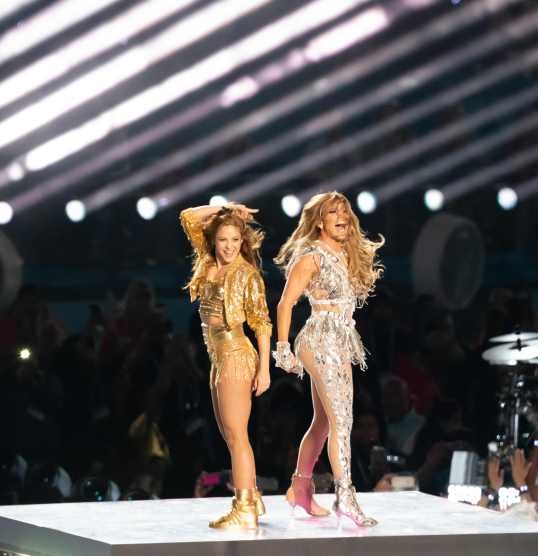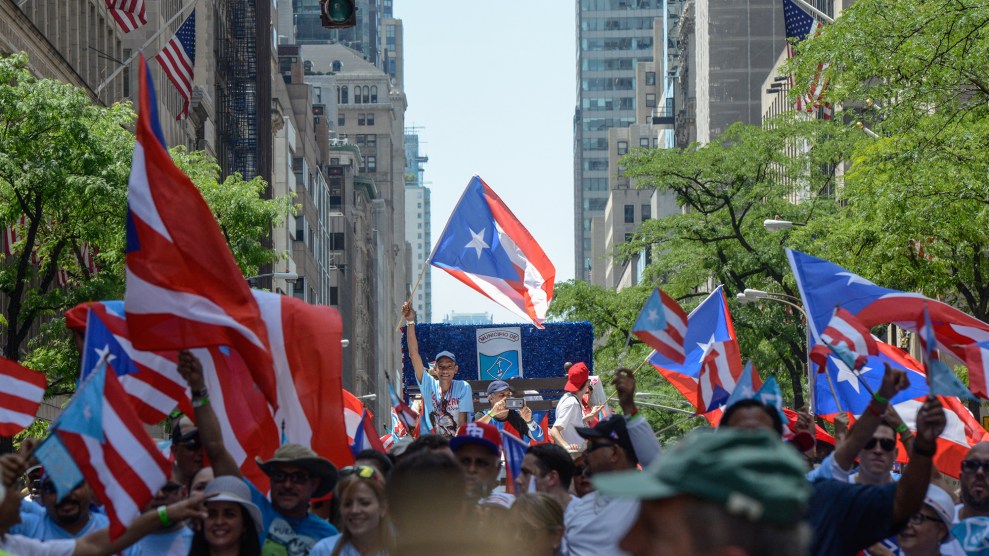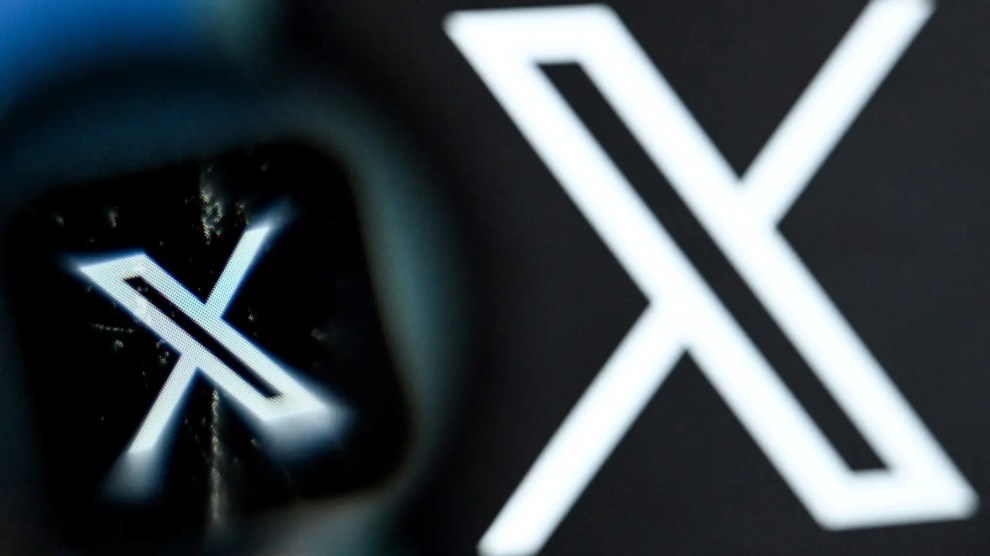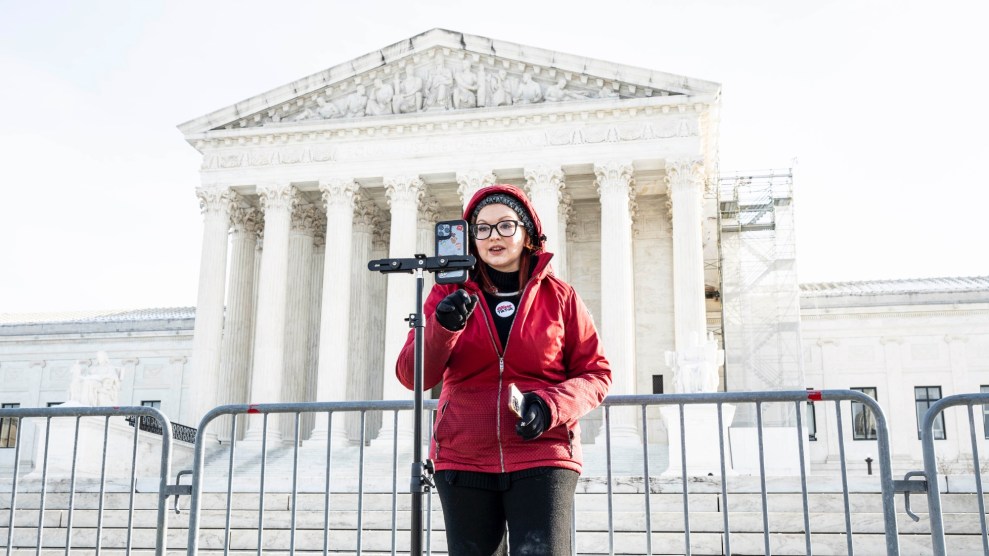
Tossing and turning, emotions were strong.Paul Kuroda/ZUMA
Even before it was announced last September that Jennifer Lopez and Shakira would headline the 2020 Super Bowl halftime show, the performance was already steeped in controversy. The commotion began a month earlier, when rapper Jay-Z revealed he was partnering with the NFL to help manage the league’s music events as well as its new social justice campaigns. Jay-Z’s decision to work with the NFL was not completely surprising—after all, he’s already told us he’s a business, man—but it was upsetting nonetheless. Mogul or not, he was abetting the NFL in its campaign to distract from the blackballing of Colin Kaepernick, the former 49ers quarterback who was exiled from the league after kneeling during the national anthem in protest of police brutality against Black people.
What made the partnership that much more upsetting is that Jay-Z had once been a vocal supporter of Kaepernick’s, rapping, “I said no to the Super Bowl / you need me, I don’t need you / Every night we in the end zone / tell the NFL we in stadiums too” on his 2018 banger “Apeshit.” Fast forward to August 2019 and his tune had suddenly changed to “we have moved past kneeling.”
Enter Jennifer Lopez and Shakira, two non-Black Latina icons who jumped at the chance to perform at what would prove to be the most Latinx Super Bowl ever. And while booking two Latina icons to headline the halftime show in the era of Trump may have felt like a win for Latinx representation, their performance only further complicated an already contentious situation. Some felt that JLo and Shakira’s decision to perform for an anti-Black organization—prominent Black artists such as Rihanna and Cardi B had publicly and righteously spurned—was a snub to Black people, specifically to Afro-Latinx people. Others thought that NFL overlords were using Latinx artists and by extension Latinx people to rehabilitate its image, a way of saying, “See, we’re not racist. We love Brown people.”
The show had been politicized before a single bar of music had sounded in Hard Rock Stadium. And then on Sunday, we saw kids in cages singing “Let’s Get Loud” and “Born in the USA,” an American flag that flipped into a Puerto Rican one, and a roster of non-Black Latinx artists dancing to historically Black music. The performance was charged in every way, along many different dimensions. To get a sense of things, I convened a panel of three smart Mother Jones colleagues: Fernanda Echavarri, Edwin Rios, and Camille Squires. We conducted our chat over Slack. An edited transcript is below.
Edwin Rios: A couple of big questions about this year’s halftime performance: Was what Jennifer Lopez and Shakira were trying to pull off too subtle for a national audience? Or was it the opposite—a bit on the nose for the sake of being on a national platform? Was it pandering and being woke for the sake of being woke, for the NFL’s benefit, or was their attempt to send a strong message using a global platform, a nod to Puerto Rico, and a crisis at the border affecting children?
Justin Agrelo: As a huge JLo fan, I feel conflicted about the whole thing overall. But right after Shakira opened with a simple “Hola Miami!” I had a moment of like, “Wow, the first words at this year’s Super Bowl, the biggest stage on Earth, are in Spanish and they’re being spoken by a Latina.”
Latinx representation is so abysmal outside of our tragedies that I think Latinxs are often like, “We’ll take what we can get,” and hold these moments of uplifting representation close to us because we aren’t used to seeing ourselves like this on this scale. But I also realize that mindset is messy because it often erases Black and Indigenous Latinxs and upholds white supremacy within Latinidad. Maybe the bar is in hell, though, that even just a simple “hola” made me feel this happy.
Fernanda Echavarri: I agree 100 percent about the feeling of joy and pride watching this. I watched next to one of my best friends who is not only Latina but also a huge fan of Shakira and JLo, like I am. There was a sense of “here we are, look at us, and listen to us” in a sports bar full of white people.
I’m coming at it from a non-Black Latinx perspective and understand the criticism of their participation in an NFL event. These last three years have felt particularly contentious and scary for a lot of Latinos in the US, so for me, this was the perfect time to have this halftime show instead of some Maroon 5 or Carrie Underwood act. And, yes, the bar is so low that we’ll take what we can get.
ER: What I kept thinking throughout the performance was how refreshing it was to see Latina icons on stage nail a Super Bowl halftime show in the heart of Miami. There were moments of pandering and virality, but it felt far more Latinx-centric than patriotic (watch the Lady Gaga halftime show, which is incredible and theatrical in its own right, but it starts with a purely American song).
I watched at a Black queer friend’s house party with a hodgepodge of a couple of other Black queer men and mostly white queer men and a couple of women (I was probably one of a handful of straight folks). It was fascinating to see their attraction to the performance. One guy said it was the “gayest halftime performance he had seen.” And yet I kept coming back to the joy and pride in seeing powerful Latinas take over the show, even though I also felt odd that the political subtext of the performance benefited the NFL overlords at a time when they have gotten crap for how they’ve approached social justice issues.
At a time when the Latinx community has felt under attack, whether from visceral rhetoric, horribly restrictive policies, or literal acts of violence, it felt deeply assuring to see two iconic Latinas leave their mark on the most overtly American sporting event. It felt more of an embrace of Latinx culture than an embrace of overt patriotism seen in previous halftime shows.
JA: Definitely. Latinx representation matters right now because it’s an argument that Latinx people deserve to be celebrated and have value despite whatever evil shit is coming out of Trump’s mouth. At a time when viral videos of bigots attacking Latinx people for speaking Spanish in public are commonplace, having them sing in Spanish on the biggest stage felt like a giant fuck you to xenophobes across this country.
But that’s also coupled with the fact that they chose to bring out Bad Bunny and J Balvin as their guests, which, for me, only further whitewashed the entire thing.
They said their performance was about “bringing people together,” but after the performance, I questioned who among us Latinx folks were they calling to that table? Not Black and Indigenous Latinx folks.
I’m not asking Shakira and JLo to tokenize anyone but a whole-ass Ozuna exists! Ozuna’s smash “Taki Taki” was a way bigger hit than “Que Calor,” (one of the songs J Balvin performed to). While JLo dancing to “Lento” by Nfasis, an Afro-Dominican artist, was dope—it was exciting to hear Dominican Dembow at the Super Bowl—it also reinforces this message that Black voices, music, dance, and aesthetics are good enough to be centered at the most Latinx Super Bowl but not Black people. Which is a tired, toxic practice within Latinidad.
ER: I think that speaks to the pandering nature of the performance. Ultimately, they had to make the performance marketable to a national audience, and so who better to bring than the faces of contemporary pop reggaeton.
Camille Squires: I agree with Justin that unfortunately, the bar is so low in whitewashed America that even speaking and singing in Spanish is a huge statement.
I actually did see the presence of J Balvin and Bad Bunny as contributing to that statement, more so than whitewashing it. Like, yes, both of them are non-Black Latinx folks, but they are the poster children of this really huge moment that reggaeton and musica urbana are having worldwide. This is my perspective as a non-Latina Black person and non-native Spanish speaker who is a fan of all of these artists simply on the basis that their music slaps. I thought the presence of all four artists on stage was a long overdue yank of the spotlight away from white Anglophone to Latinidad.
ER: I feel like J Balvin and Bad Bunny’s inclusion represents more of the influence of reggaeton in contemporary pop music, and so it definitely is fitting that they were a part of this year’s spectacle. Maybe “whitewashing” isn’t the right term, but I saw it more as an extension of what pop music is today, which happens to be capitalizing on reggaeton.
JA: Yeah maybe “whitewashing” isn’t the right term, but it was a continued whitening of an Afro-Caribbean genre and of Latinidad overall. Black reggaeton artists, specifically Ozuna, are just as big as J Balvin in that space. But Ozuna is not only Afro-Latino; he’s also from one of the countries where reggaeton was birthed, whereas Balvin, a Colombian, isn’t.
For me, Balvin being asked to perform reggaeton at the Super Bowl over someone like Ozuna felt like a missed opportunity to literally pass the mic to the Black Latinos who built the ground all of these artists stand on. It was in keeping with the media’s habit of flattening of Latin America into a monolith—a place filled with non-Black people who all have the same culture and music that eerily appear very Black. If you’re going to ignore the concerns of Black Latinxs and still choose to do the Super Bowl, you could have at least used the guest spots to center Black artists. I mean, Amara La Negra is a huge JLo fan and she’s from Miami! It was such a missed opportunity.
CS: In terms of the thornier bits, my take on JLo incorporating political messaging into her performance is that she’s damned if she did, damned if she didn’t. Sports, music, and especially the NFL have always been political. But we’re in this moment right now where all of that has been brought to the surface thanks to people like Colin Kaepernick.
So, JLo is coming into this performance with an expectation to “make a statement” or in some way “display wokeness,” but is also bound by the fact that partnering with the NFL is inherently a political statement in itself. In some ways, she’s taking the other side of the Kaepernicks and the progressives of the world by even agreeing to the performance.
But, even given those constraints, I thought it was weak, girl. The light-up-globe things hardly read as “kids in cages.” To me, that is a particular tragedy that deserves much better than “nuance” or “suggestion.” It is a human rights crisis, and we need to be yelling about it from the top of our lungs at all times. My take on the politics is that if you’re going to say it, say it with your chest or not at all.
ER: I actually didn’t fully comprehend the kids in cages initially, which is probably bad. I saw the orbs and felt a bit confused.
But as a Puerto Rican kid, I felt an unexpected source of pride seeing what I thought would simply be American flag garb then turn into a Puerto Rican flag. I got off the couch and shouted “aye!” I hadn’t seen anything like that before, let alone during halftime of the Super Bowl.
JA: That moment shook me too. Just seeing the flag on this stage during this time when the Puerto Rican diaspora is going through hell did bring me a sense of pride at first. But then I realized she placed an American flag on top of a Puerto Rican flag—a bit of maybe unintended colonial symbolism. Maybe JLo’s intentions were in the right place— this “Puerto Ricans are US citizens, too” argument certainly isn’t unique to her. But I couldn’t ignore the fact that for many Latinxs, specifically for Puerto Ricans, the American flag is not a symbol of unity and freedom, but one of violence and occupation.
CS: To what you were saying, Eddie, I think that is really important context to think about what other artists have done with this recent “climate” by comparison. I mean, certainly compared to Lady Gaga, this year’s performance had a lot more to say.
But also, the pressure was on Shakira and JLo as Latinas in a way that it never would have been for Gaga. But also, the idea of the NFL “addressing” social justice with “measured” tactics such as the Inspire Change initiative just gets under my skin. To me it reeks of white moderate.
To use a maybe not 100 percent apt comparison, it’s like having cops in rainbow-painted cars at Pride. Like, you’re cops! You can never be about queer liberation! Pride was literally created in response to you!
ER: I mean, yeah, the NFL has never been the patron saint of social justice causes. It’s an organization emboldened by a post-9/11 pride for patriotism. It’s a way for the NFL to say, with the help of Jay-Z: We care about this! But it’s also a way for the NFL to exploit and co-opt a prominent Black voice, one who is too a wealthy businessman in his business, man, to show they “care” about criminal justice reform and gun violence.
Beyoncé showed off Black pride in her performance with Bruno Mars. It was fun as hell as well as powerful. But it was bookended by Coldplay and their necessary memorialization of Super Bowl halftime shows of years past. Lady Gaga could have made a more overt political statement after the 2016 election—aside from “Born This Way” and her medley of American anthems—but she didn’t. So to see JLo carry a Puerto Rican flag and to see kids in mock cages is actually more politically on the nose than I, at least, expected.
JA: Definitely. I just wish JLo had waved a black and white Puerto Rican flag, left that colonial American flag at the store, and threw up an “abolish ICE” sign, but one can only dream.
CS: Wow, can you imagine JLo saying “abolish ICE”?! That would be dope, but certainly is a dream, as she’s never really incorporated politics into her celebrity, which I know you know much more about than me, Justin. There’s also just the fact that we’re demanding more politics from our celebrities in general these days, which is well-trodden ground at this point. But it means that they’re going to have to start negotiating some of the contradictions in their posture. How would Beyoncé’s performance have gone over today, I wonder.
ER: Her decision to don the Black Panther garb and feature Black women prominently during the performance showed the power of the celebrity protest. It also showed her savvy—Beyoncé embracing her Blackness on a public stage before a national audience while promoting her art at the same time. Honestly, in a lot of ways, that was the precursor to Beychella.
CS: She also benefited from it commercially—it was in keeping with the theme of the “Formation” music video, and she also used the Super Bowl to introduce and promo her “Formation” tour, so by no means am I making Beyoncé out to be this completely altruistic activist for the people without self-interest. She, like her husband, is 100 percent a capitalist and both are strategic about their brand in every move they make. Still, on the question of threading the needle of injecting your politics into an institution while also still benefiting from them monetarily or otherwise, I thought Beyoncé stuck the landing the best out of any recent attempts.
JA: But in hindsight does Jay-Z’s “we’re past kneeling” and Beyoncé’s attending this year’s Super Bowl dilute her 2016 message or make it feel more like she was commercializing liberation work? Is there something off in going from a “Formation” video with a “hands up, don’t shoot” reference to a post-Kaepernick Super Bowl?
ER: I mean, you could also argue, cynically, that her Super Bowl performance in 2016 was just capitalizing on that liberation display for commercial appeal. But we’ve also seen Beyoncé put her Blackness on full display with “Homecoming,” and I think it’s possible to separate Jay-Z’s approach from Beyoncé’s.
CS: No, Justin, I think you’re right. The Knowles-Carters posture toward the NFL now makes their past actions seem less potent. Like, they sold out a bit. With this Super Bowl and going forward, Jay-Z has in a very direct way thrown his hat in with the NFL, so it definitely dilutes his previous activist stance.
But even if Jay-Z is a scab now, it’s undeniable that this year’s halftime performance was a historic one. I guess he gets credit for his involvement in that decision. The presence of JLo and Shakira onstage surrounded by a bunch of beautiful Black and Brown dancers was a powerful statement, whatever Jay-Z’s and the NFL’s motives.
















